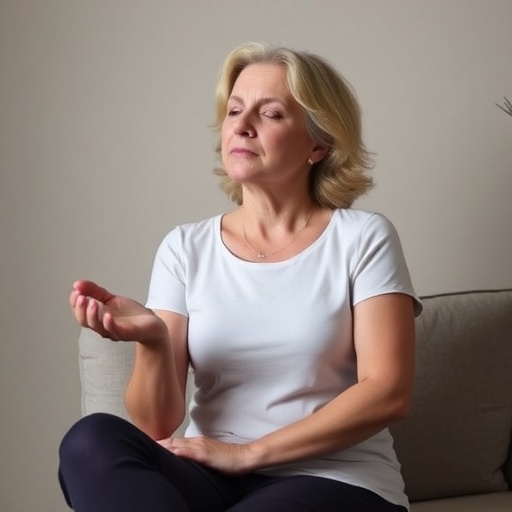In the realm of menopause symptom management, a novel approach emerges, promising relief from one of the most distressing issues faced by millions of women globally: hot flashes. A groundbreaking randomized clinical trial led by Dr. Gary R. Elkins at Baylor University reveals that a straightforward, self-administered hypnosis intervention can reduce both the frequency and intensity of hot flashes by over half, marking a significant stride toward non-pharmacological treatment options.
Hot flashes, characterized by sudden feelings of warmth, sweating, and discomfort, afflict up to 80% of women undergoing the menopause transition, with a staggering 25 million women in the United States alone reporting these symptoms annually. For breast cancer survivors, the incidence is even higher, as many experience severe hot flashes triggered by anti-cancer therapies, which restrict their treatment options given the contraindications for hormone replacement therapy.
This innovative study, published in the prestigious journal JAMA Network Open, diverged from traditional mind-body intervention trials by employing a rigorous sham control condition utilizing white noise, thereby isolating the specific efficacy of self-hypnosis beyond placebo effects. The trial enrolled 250 postmenopausal women, a diverse cohort that notably included nearly a quarter with a history of breast cancer, a demographic often excluded from hormone-based hot flash treatments due to safety concerns.
Upon completion of a six-week course involving daily engagement with self-hypnosis audio sessions, participants reported a remarkable average reduction in hot flash frequency and severity by 53.4%. Impressively, these benefits persisted and even amplified at the three-month follow-up, with a 60.9% reduction documented, far surpassing the 40.9% decrease observed in the control group subjected to sham white noise.
The technique’s amplified efficacy in breast cancer survivors, exhibiting a 64% reduction in hot flashes after six weeks, underscores its potential as a viable, nonhormonal therapeutic strategy. This finding is particularly salient given the limited treatment options available to this high-risk population. The home-based, self-guided nature of the hypnosis intervention offers an accessible, low-cost alternative that circumvents the necessity for frequent clinical visits.
Dr. Elkins emphasizes that the intervention’s delivery format—self-administered sessions guided by audio recordings or digital applications—facilitates independent usage, empowering women to manage their symptoms discreetly and effectively. This modality’s flexibility addresses significant barriers in healthcare access, especially for those in rural or underserved areas.
Beyond symptom alleviation, the longitudinal data reveal ancillary benefits of self-hypnosis, including marked improvements in sleep quality, mood stabilization, cognitive focus, and overall life satisfaction. At the 12-week evaluation point, nearly 90% of participants in the hypnosis group reported subjective well-being enhancements compared to 64% in the control arm, signaling multifaceted therapeutic impacts.
The trial’s methodological rigor, particularly its employment of an active control, sets a new standard in evaluating mind-body interventions by parsing out the specific physiological and psychological mechanisms of hypnosis from expectancy influences. This approach bridges a critical gap in hypnosis research, addressing prior critiques regarding placebo confounds.
Mechanistically, hypnosis is postulated to engage neurological pathways involved in thermoregulation and emotional processing, modulating autonomic nervous system activity that underpins hot flash episodes. The Mind-Body Medicine Research Laboratory at Baylor University, under Dr. Elkins’ direction, continues to interrogate these neurophysiological substrates via advanced neuroimaging and psychophysiological assessment techniques.
Self-hypnosis, as delineated by Dr. Elkins, extends beyond menopausal symptom management, holding promise for broader clinical applications such as anxiety modulation, chronic pain management, and stress reduction. The scalability and adaptability of this intervention recommend it as a versatile component of integrative health paradigms.
The implications of this study are profound, offering a rigorously tested, patient-empowering alternative to hormone therapy at a time when concerns about the latter’s safety persist. The findings herald a shift towards personalized, mind-body centered care in menopausal health management, potentially transforming clinical guidelines and patient choices.
Further research spearheaded by Dr. Elkins and collaborators at institutions including the University of Tennessee and University of Nebraska is underway to refine hypnosis protocols and optimize outcomes for diverse populations. Funded by the National Center for Complementary and Integrative Health, these endeavors underscore the expanding recognition of hypnosis as an evidence-based clinical tool.
As menopause-related healthcare continues to evolve, this study stands as a beacon of innovation, highlighting how psychotherapeutic techniques grounded in neuroscience can ameliorate distressing somatic symptoms. The future of menopause care may well be one where non-invasive, empowering strategies like self-hypnosis are integrated seamlessly into comprehensive treatment regimens.
Subject of Research: People
Article Title: Self-Administered Hypnosis vs Sham Hypnosis for Hot Flashes: A Randomized Clinical Trial
News Publication Date: 11-Nov-2025
Web References:
- JAMA Network Open Article: DOI: 10.1001/jamanetworkopen.2025.42537
Keywords: Hypnosis, Menopause




